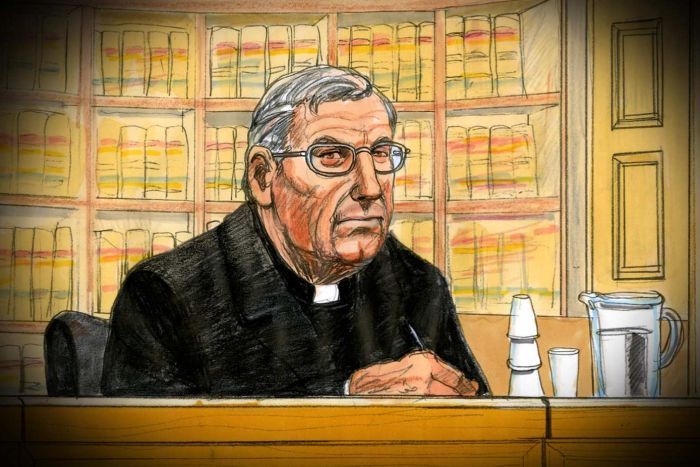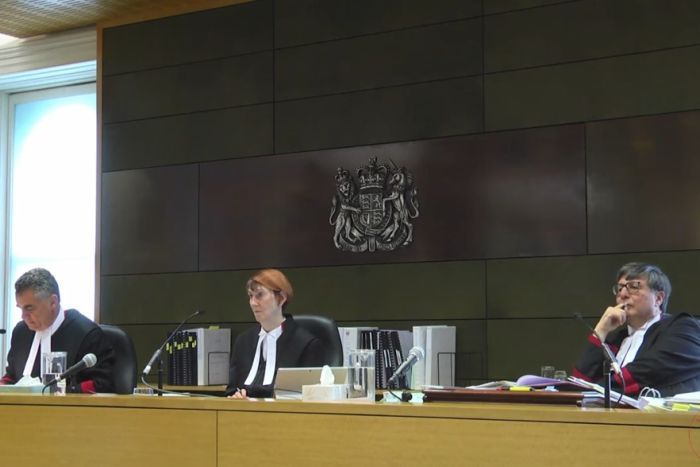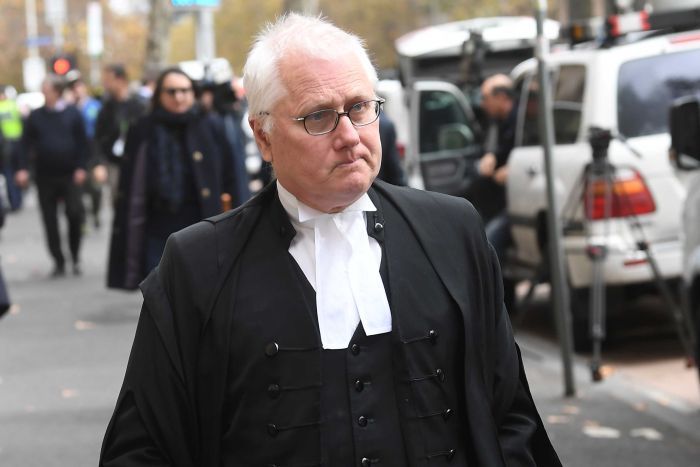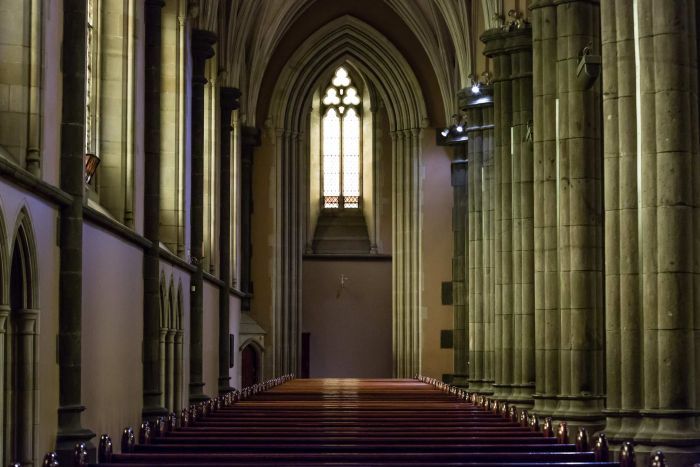George Pell's Lawyer Tells Appeal Court Judges Child Sex Abuse Offences "Realistically Impossible"
By Emma Younger
George Pell's lawyer has told an appeals court the child sex abuse offences the Cardinal is now in jail for are "impossible" and a jury should have found him not guilty even if they believed his victim. In written submissions, Pell's lawyers listed 12 other reasons why the offending could not have occurred, including issues with Pell's location in the church at the time of the offending and with the dates of the offences in the 1990s. Mr Walker argued Pell's clerical robe could not have been pulled aside to commit the "atrocious acts" he has been convicted of. Pell, 77, is serving a six-year jail term for sexually abusing two choirboys when he was archbishop of Melbourne. He fronted the appeal in person, after being taken to court in a prison van and escorted in by guards on Wednesday morning. His appeal is being heard by three Court of Appeal judges and is being live-streamed on the court's website. Some of Pell's relatives and supporters were in the full courtroom for the hearing, as well as abuse survivor advocates and reporters. Pell wore his clerical collar, which he did not wear while he was sentenced, while he sat in the dock and took notes throughout the proceedings. Space to play or pause, M to mute, left and right arrows to seek, up and down arrows for volume. Last December, a jury found him guilty of abusing the boys at Melbourne's St Patrick's Cathedral after a Sunday mass in 1996, and abusing one of the boys a second time several months later. The former senior Vatican official pleaded not guilty at trial, but was convicted of one count of sexual penetration of a child under 16 and four counts of committing an indecent act with a child. Clerical robes make allegation an 'impossibility': Pell's lawyer Pell and his legal team are arguing the convictions should be overturned on three grounds, including the core argument that the verdicts are "unreasonable". Mr Walker told the court that "questions of probability" were at the heart of the appeal. He said there was no doubt the jury believed the complainant and disbelieved Pell, but said it did not matter whether the complainant was believed or not. He said based on the evidence, the indications of impossibility were so strong they could not have excluded reasonable doubt. He argued the Crown did nothing to respond to the "inherent improbability" of the witness's testimony. He outlined the case put forward by Pell's victims, including the fact the abuse took place when Pell was dressed in "full robes" after mass. "Incidental to that proposition are matters of physical improbability to the point of impossibility of the simple pulling aside of those robes in order to commit the alleged atrocious acts," Mr Walker said. Mr Walker said the possible dates of the offending were an "important" part of Pell's appeal. The jury which convicted Pell considered the first abuse as having taken place after Sunday mass on either December 15 or December 22 in 1996. Mr Walker said the timing of events on each of the possible dates meant there was a "lack of realistic possibility of this offending having taken place". "And if it didn't take place on one of those two dates, then the Crown case fails," he told the court.
Mr Walker said "credible evidence" had placed Pell greeting congregants at the western doors of the cathedral, some distance from the sacristy when the first offending occurred. He said that evidence had not been successfully challenged by the Crown, and it placed the then-archbishop in a location which made the offending "impossible, or simply not a realistic possibility". Mr Walker also highlighted what he said were discrepancies between the victim's evidence and the facts relating to the second offence on February 23, 1997. While the victim described Pell as "saying Mass" on that date, Pell was in fact simply presiding over the service without speaking, Mr Walker said. Mr Walker also said police had not made any effort to interview the priest who actually delivered the Mass. Death of second victim an 'obstacle': Pell's lawyer Mr Walker also drew attention to the fact that Pell's other victim in the 1996 offending, who died in 2014, had denied he was abused when asked by his mother. The fact that the second victim could not be called to give evidence about that statement stood as an "obstacle in the way of both sets of verdicts", Mr Walker said. Mr Walker said the jury would have had to speculate to put the second victim's reported denial aside because there was no evidence given to discredit it. "Say he had not died, say he was available and willing to be interviewed, first by the police and then by prosecutors," he said. "Say that he adhered to the out-of-court statement that was reported to the jury. "It's impossible for that answer to be true and the complainant's account of the first episode also to be true."
Before the hearing began, lawyers representing the father of the deceased victim said the appeal had "caused him [the father] sleepless nights". "Our client is nervous but also somewhat relieved that this day has finally arrived," lawyer Lisa Flynn said. "Understandably he is feeling really anxious knowing that George Pell's conviction could be overturned but he is extremely hopeful that this will not be the case." The vast majority of the day was spent hearing Mr Walker's arguments on the first cause for appeal that the verdict was unreasonable and less than half an hour on the other two reasons. The second reason was that the judge who presided over Pell's trial should have allowed the jury to view a video animation purporting to show the location of witnesses in the cathedral at the time of the offending. Pell's third argument for appeal was that he was not arraigned that is, asked to enter a plea of guilty or not guilty in the presence of all potential jurors, which is required by the law. Pell is first requesting leave to appeal permission for his appeal to be considered but his application for leave and the appeal itself are being argued at the same time. The prosecution is expected to respond to the arguments from Pell's legal team on Thursday. Judges toured St Patrick's Cathedral before hearing
The three judges could hand down a decision during the two-day hearing, or could instead reserve their decision for a future date. If they do rule that the guilty verdicts are unreasonable, Pell will be acquitted and immediately released from jail. But if the judges find that the guilty verdicts were reasonable and instead accept the second or third grounds of his appeal, a new trial could be ordered. The three judges undertook a significant amount of research before Wednesday's hearings, including a tour of St Patrick's Cathedral, Chief Justice Anne Ferguson said at the start of the hearing. Justice Ferguson made clear that if judges ask questions during the hearings, they are not taking a view on the overall case, but "simply testing the argument". Pell has indicated he will not seek a reduction to the six-year sentence if the appeal against the guilty verdict fails.
|
.
Any original material on these pages is copyright © BishopAccountability.org 2004. Reproduce freely with attribution.



